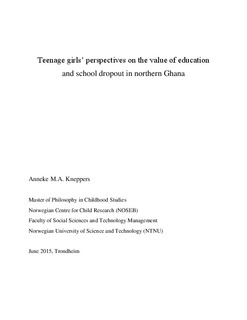| dc.description.abstract | Although international policies related to formal education and their local translations have led to an increased number of enrolment and attendance rates, dropout among teenage girls appears to be persistent in northern Ghana. To tackle the school dropout problem, we need to move beyond access and pay attention to the processes of how and why girls drop out from formal schooling.
This study aims to explore both the value of education according to the girls and the dynamics between the factors that contribute to the school dropout process. It aims to understand how school dropout impacts the lives of teenage girls and why it is important to deal with the issue. In doing so, it intends to create policy recommendations that effectively improve the lives of teenage girls.
This research was carried out in a deprived locality in northern Ghana, where traditional and cultural mind sets as well as the socio-economic situation, seem to characterise people’s way of life. The participants of this study consisted of 13 girls between the age of 12 and 18 years old, who went through the process of dropping out of school.
This study drew on the social studies of childhood, which suggests that we perceive child participants as valid informants with who research needs to be done. Empirical material was collected by means of ‘participant-friendly’ methods that were interactive and adjustable to the individual participants and settings. The methods that were used comprise semi-participant observation, storytelling, semi-structured interactive interviews, life mapping and in-depth discussion. Apart from the child participants, three adult informants were included in the study: directors of schools and the local Girl Child Education Coordinator.
Besides key theoretical perspectives from the social studies of childhood, the capability approach was used as a theoretical framework. The key point of the theory is that we can measure a person’s well-being based on their freedom to choose the life one values. When an individual acquires capabilities, opportunities will open up, his or her freedom will expand and well-being enhanced. Education through formal schooling is an important space for the girls where capabilities can be acquired and which enhances their well-being.
The findings of this study reveal that dropout occurs as a complex process in which familial, cultural, economic and institutional factors push and pull teenage girls from school. Poverty and household survival strategies, such as migration and work of the girls, constrain the girls’ schooling opportunities. Institutional environments further compound the problem. These are in other words, the conversion factors that negatively influence the transformation of educational resources into capabilities.
The value of education according to the girl participants, is high. Formal schooling prepares them to ‘become somebody’ in the future. The capacities that the girls attain through school, help them to earn an income, to be able to aspire and dream and to stand up for themselves. These capabilities are particularly important for teenage girls to survive and live a decent life in the deprived area in which societal structures constrain their life chances.
It is suggested that in order to improve schooling achievements of teenage girls, policy and intervention programs in Ghana need to address the processes that are happening both at the individual and structural level, and the interconnected factors that shape the processes of dropout. | nb_NO |
